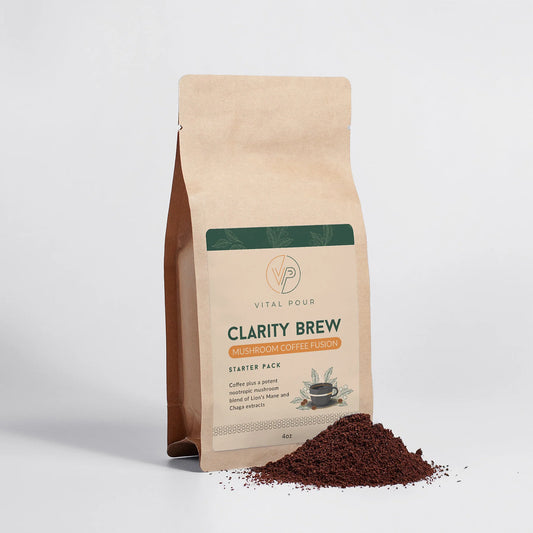Ever wondered where the buzz around adaptogens comes from - or whether they actually work?
Adaptogens are natural substances, often herbs and fungi, believed to help the body resist stress, restore balance, and boost vitality. But these aren’t just wellness trends.
For thousands of years, adaptogens have played a powerful role in traditional healing systems like Traditional Chinese Medicine (TCM) and Ayurveda.
This article explores how these time-tested remedies earned their reputation, how ancient cultures used them, and what modern clinical research says about their benefits today.
Ancient Roots: Wisdom of Traditional Medicine

Long before the term "adaptogen" was coined, healers and scholars in ancient civilizations meticulously documented the effects of various plants and mushrooms.
Traditional Chinese Medicine (TCM):
-
TCM, with a history spanning over 2,000 years, classified herbs based on their energetic properties and their ability to harmonize the body's vital energy, or Qi. Many substances now recognized as adaptogens were considered "superior herbs" or "tonics."
-
These superior herbs were believed to nourish all three "treasures" – Jing (essence), Qi (vital energy), and Shen (spirit). They were taken regularly to promote longevity, enhance vitality, calm the mind, and strengthen the body's resistance to disease and environmental challenges.
-
Examples include Ginseng (Ren Shen), Astragalus (Huang Qi), Schisandra (Wu Wei Zi), and Reishi mushroom (Ling Zhi). Ling Zhi, the "Mushroom of Immortality," was particularly prized for its ability to calm the spirit and enhance wisdom.
Ayurveda:
-
Ayurveda, originating in India over 5,000 years ago, emphasizes balance among the body's three doshas (Vata, Pitta, Kapha). Certain herbs, known as Rasayanas, were used to promote longevity, vitality, and rejuvenation.
-
Many Rasayanas possess adaptogenic qualities, helping the body cope with stress and maintain equilibrium. They were used to enhance Ojas (vital essence, similar to Qi) and improve overall resilience.
-
Key Ayurvedic adaptogens include Ashwagandha (Withania somnifera), Holy Basil (Tulsi), Shatavari (Asparagus racemosus), and Brahmi (Bacopa monnieri).
Other Indigenous Traditions:
-
Indigenous cultures worldwide, from Siberian shamans using Rhodiola Rosea to Amazonian tribes utilizing Suma (Brazilian Ginseng), independently discovered and utilized plants with adaptogenic properties to enhance endurance, combat fatigue, and adapt to harsh environments.
These ancient systems, through centuries of empirical observation and practice, identified plants that helped individuals thrive under pressure, demonstrating a profound understanding of holistic health and resilience.
The Birth of the Adaptogen Concept: Soviet Era Research
The modern scientific concept of adaptogens emerged in the mid-20th century, largely driven by research in the Soviet Union during the Cold War era.
Dr. Nikolai Lazarev (1940s-1950s)
A prominent Soviet pharmacologist, Dr. Lazarev was tasked with finding substances that could enhance the performance and resilience of soldiers, athletes, and workers without the harmful side effects of stimulants.
He sought natural compounds that could increase the body’s nonspecific resistance to a wide range of stressors.
Defining Adaptogens
In 1947, Lazarev coined the term "adaptogen" to describe these substances. He defined them as agents that help an organism counteract any adverse effects of a physical, chemical, or biological stressor by generating nonspecific resistance.
Dr. Israel Brekhman (1950s-1980s)
A student and colleague of Lazarev, Dr. Brekhman, along with his research partner Dr. Igor Dardymov, further refined the definition and criteria for adaptogens:
-
An adaptogen must be non-toxic to the recipient.
-
An adaptogen must produce a nonspecific response in the body—an increase in the power of resistance against multiple stressors, including physical, chemical, or biological agents.
-
An adaptogen must have a normalizing influence on physiology, irrespective of the direction of change from physiological norms caused by the stressor.
Extensive Research
Soviet scientists conducted extensive research on numerous plants, including Eleuthero (Siberian Ginseng), Rhodiola Rosea, Schisandra chinensis, and Aralia mandshurica.
Thousands of studies and clinical trials were performed, many focusing on their effects on physical endurance, mental performance, and stress adaptation in various populations.
State Secrets
Much of this early Soviet research remained classified for decades, contributing to a slower adoption of the adaptogen concept in Western medicine.
Modern Clinical Research: Validating Ancient Wisdom

In recent decades, with increased global scientific collaboration and advanced research methodologies, the study of adaptogens has gained significant momentum worldwide.
Modern clinical research is now providing scientific validation for many of the traditional uses and proposed mechanisms of action:
HPA Axis Modulation
Numerous studies have demonstrated that adaptogens can modulate the Hypothalamic-Pituitary-Adrenal (HPA) axis, helping to normalize cortisol levels and improve the body's response to chronic stress. This is now considered a primary mechanism of adaptogenic action.
Neuroprotective Effects:
Research on adaptogens like Lion's Mane and Rhodiola has shown potential for enhancing cognitive function, protecting neurons, and stimulating nerve growth factor (NGF).
-
Anti-Fatigue and Performance Enhancement: Clinical trials have supported the use of adaptogens like Cordyceps, Rhodiola, and Ginseng for improving physical stamina, reducing fatigue, and enhancing athletic performance.
-
Immune System Modulation: The immune-supportive properties of mushrooms like Reishi, Chaga, and Turkey Tail, as well as herbs like Astragalus and Ashwagandha, are being extensively studied, revealing their ability to modulate various immune cells and pathways.
Anti-inflammatory and Antioxidant Effects
Many adaptogens possess significant anti-inflammatory and antioxidant properties, which contribute to their stress-protective and health-promoting effects by combating oxidative stress and chronic inflammation.
Mental Health Support
Studies are exploring the potential of adaptogens like Ashwagandha, Rhodiola, and Holy Basil in managing symptoms of anxiety, depression, and improving overall mood and well-being.
Standardization and Quality Control
Modern research also focuses on identifying and standardizing the active compounds in adaptogens (e.g., withanolides in Ashwagandha, rosavins in Rhodiola, ginsenosides in Ginseng) to ensure product quality, consistency, and efficacy in clinical trials and commercial products.
The Future of Adaptogens
The journey of adaptogens from ancient remedies to scientifically studied compounds is ongoing. As research continues to uncover their complex mechanisms and diverse benefits, their role in integrative medicine and everyday wellness is likely to expand.
Future directions include:
-
More large-scale, rigorous human clinical trials.
-
Deeper understanding of synergistic effects when combining adaptogens.
-
Personalized adaptogen protocols based on individual genetics and stress profiles.
-
Sustainable sourcing and cultivation practices to meet growing demand while protecting biodiversity.
🌿 Ready to Experience the Power of Adaptogens for Yourself?
Upgrade your daily routine with Vital Pour’s Mushroom Coffee Fusion - a smooth, energizing blend powered by Lion’s Mane and Chaga. It’s crafted to help you stay sharp, support immunity, and keep stress in check — without the crash of regular coffee.
✅ 100% Fruiting Body Extracts
✅ Organic, Lab-Tested Ingredients
✅ Smooth Taste, Powerful Benefits
👉 Shop Now and feel the difference of adaptogenic energy.
Conclusion:
The history of adaptogens is a testament to the enduring wisdom of traditional medicine and the power of nature to support human health.
What ancient healers observed through centuries of practice is now being illuminated by modern science, revealing a sophisticated class of natural agents that can help us navigate the stresses of life with greater resilience and vitality.
As our understanding evolves, adaptogens are poised to play an increasingly important role in promoting holistic well-being in the 21st century and beyond.


